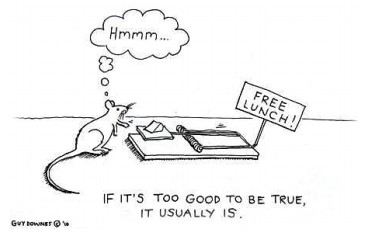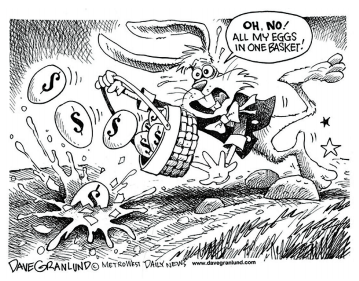CONSERVE. PLAN. GROW.®
I attended an investment conference recently and one of the speakers was Stephen Friedman, former Chairman of Goldman Sachs. During his fireside chat, he mentioned that when it comes to investing, he follows some basic rules of risk management. He said that these rules were universal truths that grandparents have shared with their grandchildren over multiple generations. These maxims provide parameters on avoiding or minimizing losses that are as much a part of investment management as trying to find successful long-term investments. I have utilized some form of each these rules to guide my analysis over the course of my own investment career and thought I would share them with our readers.
“If it sounds too good to be true, then it is too good to be true.” This phrase is a warning against falling prey to financial offers that sound enticing and tempting, almost too good. The offer is typically fl awed in some respect. For example, when I see an investment that pays above market dividends or interest, then I know that there are elevated risks with this investment. Several years ago, non-traded Real Estate Investment Trusts (REITs) were being widely sold with a 10% yield. This income return was attractive relative to other comparable investments that paid half that amount. However, these REITs could not maintain their payouts and there was no market in which to sell them when investors wanted to bail out of them. I have used the “too good to be true” phrase dozens of times when describing why a client should avoid an investment opportunity.
Mr. Friedman shared with us the expression “Trees don’t grow to the sky,” in which he explained that we should be mindful that there are typically limits on the growth rates that companies can sustain over longer periods. When we look at companies with extraordinarily high rates of growth, we expect these companies to command a high valuation. The danger is assuming that growth will continue at the same rapid pace as the company becomes larger. As a company grows larger, it is usually difficult for it to maintain its high growth rate. We saw investors bidding up the value of companies during the dot-com bubble based on the erroneous assumption that extraordinary growth rates could be maintained for many years to come.
“If you go to bed with dogs, then you will wake up with fleas” was another of Mr. Friedman’s favorite phrases. This adage has been attributed to Ben Franklin and refers to the disappointment likely to result from investing in poor quality companies (also known as “dogs” in investment parlance). Enron comes to mind when I think of this axiom. Enron was a company that was growing rapidly but was doing so based on acquisitions fueled by questionable accounting practices. The stock rose sharply and fell even faster once investors became aware of the fraud. The CFO ended up serving prison time and investors who stuck with the company lost their entire investment. We have always tried to build portfolios with high quality businesses that are managed by senior officers known as much for their integrity as their business acumen.
An investment maxim that has stood the test of time is “Don’t put all of your eggs in one basket.” In terms of prudent investing, this means to be wary of concentrating too much of your investment assets in one security or one economic sector. As prudent investment advisors, we are constantly preaching the advantages of diversification which is the strategy of avoiding the risk of holding concentrated positions. Until the financial crisis hit in 2008, investors in bank stocks had done very well for decades by buying and holding bank stocks. The banks were steady earners and their stock performance had been quite good for long periods of time. It was only natural for portfolio allocation of bank stocks to increase and investors who had not kept their overall risk exposure to the financial sector to an acceptable level suffered extraordinary losses as bank stocks got crushed. During the financial crisis, it was not unusual to see investors lose 80% or more of the value of their investments in this sector. It was a painful experience for investors who had not properly diversified their portfolios.
Mr. Friedman mentioned that one of his favorite quotes came from the title of a successful business management book written by one of the founders of Intel, Andy Grove. The book is titled “Only The Paranoid Survive” and the point Grove was making was that success can breed complacency and complacency leads to failure. Friedman also believes that the quote supports the proposition that investors should exercise caution when they consider investment opportunities. One example of how we exercise caution in crafting client portfolios is our custom of including less volatile fixed income investments in a portfolio even when we believe that better long-term returns will come from our equity investments. A healthy dose of fear can be helpful especially during times when asset values are rocketing higher.
Mr. Friedman quoted Baron Nathan Rothschild, the wealthy British 18th century investor, as saying “Fortunes are made by buying low and selling too soon”. A companion quote is “pigs get fat, hogs get slaughtered”. As one of my clients used to tell me, “No one goes broke taking a profit”. These quotes are a reminder that sometimes it is a good idea to rebalance a portfolio and take profits on a successful investment.
Toward the end of his remarks, Mr. Friedman told us a story about the importance of contingency planning. When he was playing a leading role at Goldman Sachs, he was concerned that because their offices were located on low land on the island of Manhattan, they could be at risk of flooding during a severe storm. He directed that the firm maintain a large supply of sandbags and deploy them whenever severe storms were approaching. For years he maintained this policy at considerable expense and without any tangible benefit. Then Hurricane Sandy hit and because the firm was properly prepared, their building avoided cataclysmic water damage unlike many of their Wall Street neighbors.
Adhering to Mr. Friedman’s time-tested investment rules is an important component of successful investing. Our firm practices appropriate risk management and contingency planning for client portfolios as an integral part of our portfolio construction and management. We strive to build durable portfolios that can weather any kind of economic or financial storm. We do this by investing in globally diversified portfolios that are consistent with one’s investment objectives, risk tolerance, and time horizon.


